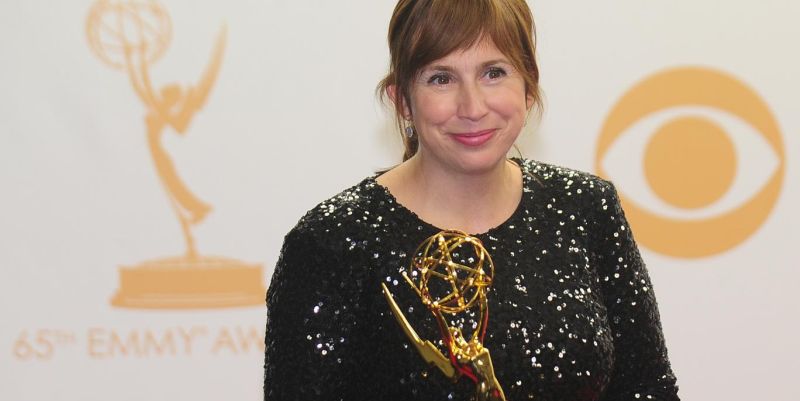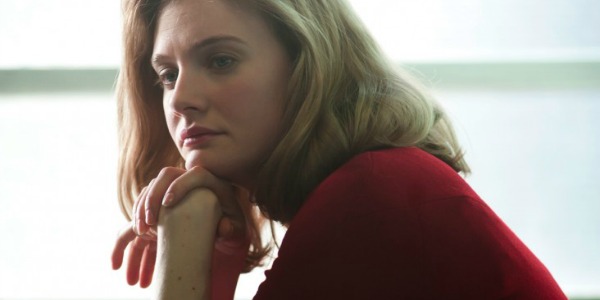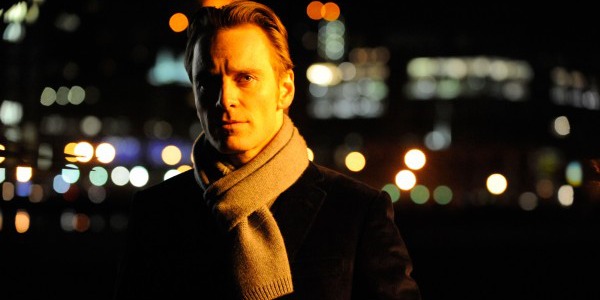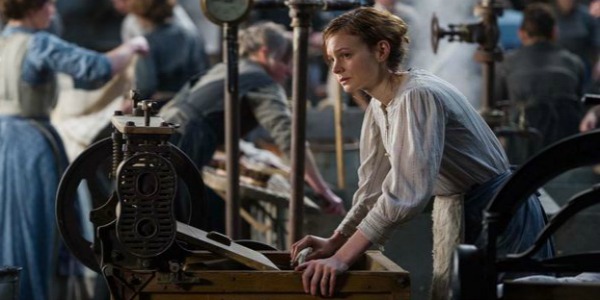The Beginner’s Guide: Abi Morgan, Screenwriter

I love film, more than people probably, and I will…
I wouldn’t be surprised if you hadn’t heard the name Abi Morgan, but I would be very surprised if you hadn’t at least heard of one of her many successes. The Hour? The Iron Lady? Going from playwright to TV to film, and all the way back around again Morgan has forged the foundations for a varied and successful career.
Then in 2015, with simulatenous successes on the both the big screen (Suffragette) and small (River), Morgan proved herself to be one of the most versatile screenwriters working in the industry today.
Beginnings
Morgan was born in Cardiff in 1968, to an actress mother and theatre director father. After her parents divorced as a teenager she frequently moved around the country. With her family background, and her upbringing (which is akin to many an actor’s origins) it seemed likely that she, like her sister, would want to become an actress. However, Morgan changed her mind and went on to study drama and literature at Exeter University before going on to the Central School of Speech and Drama.
However, despite the success she now claims, Morgan was reticent about showing her writing work to anyone, and it wasn’t until 1998 that she would have her first play, Skinned, produced at the Nuffield Theatre, near Southampton. What she did between her university years and this time is a mystery, to this writer anyway. However, in 1998 she would also gain her first TV writing credit for the series Peak Practice and has been writing consistently ever since .
On The Small Screen
While Morgan continued to work as a playwright (and was nominated for the Olivier for ‘Most Promising Playwright’ in 2002) she moved more forcefully into television. For much of Morgan’s career, her trademark has been adapting works or taking inspiration from historical stories. Her TV work has included the Royal Wedding, a TV movie about the 1981 wedding of Charles and Diana, the multi BAFTA-winning Sex Traffic, and the BBC miniseries of Sebastian Faulks’ Birdsong.
However, Morgan’s original work has been, by far, her most successful. The Hour was no doubt what bolstered her reputation and gained her attention from film producers. Only running for two series, The Hour was a look at the makers of a fictional TV news programme during the 1950s, it starred Ben Whishaw, Romola Garai and Dominic West. The show was masterfully balanced as Morgan delved into not only the pressures and ethics of making such a show, but the personal lives of the people involved. Part romantic drama, part crime drama, Morgan also found space to create possibly her greatest character to date: Bel Rowley (played by Garai).

Bel is a producer in a time when women weren’t producers. She is in a constant battle to run a news programme in the way she deems fit; stuck between the word of her bosses, the word of the censors, and her own ethical stance. More than this she is stuck in a emotional tug of war between her friend Freddie (played masterfully by Ben Whishaw) and the programme’s good looking presenter Hector (West).
Bel is a complex character and, like Lix (a secondary character played by Anna Chancellor), is a woman to be reckoned with. The female characters that Morgan creates are pivotal to not only why her writing is so good, but why it is so important. For her sterling work on The Hour Morgan won the 2013 Emmy for Outstanding Writing for a Miniseries, Movie or a Dramatic Special.
Grander Things
Like much of her TV work Morgan has taken inspiration from other works, or real life events, for the film screen. Her first big screen adaptation was of the Monica Ali book Brick Lane. It is unclear whether Morgan adapted the book in tandem with or in addition to Laura Jones (a seasoned writer of book adaptations), what is clear is that the film was unsuccessful. While many people appreciated the film’s drama and subtlety, many others thought that it stereotyped the experience of the Bangladeshi immigrant. Many detractors cited the white middle class status’ of director Gavron and writers Jones and Morgan as a reason for the film’s problems. The film, in fact, simply doesn’t work. It is too simplistic and on many occasions, boring. However, it marked a movement in Morgan’s career, and perhaps was regarded as a lesson too.
It was a few years later that Morgan returned, with a grand entrance, to write for film. 2011 not only saw The Hour come to the television screen, but also the release of both The Iron Lady and Shame (the latter of which she wrote with director Steve McQueen). The Iron Lady was always going to be a contentious script, as the lady (Margaret Thatcher) herself had so many detractors and supporters. However, there is no doubt that Morgan did a sterling job as a writer. Choosing to write about Thatcher objectively and with no agenda is a trait that filters across much of her work. Morgan isn’t there to judge, she’s there to write.

Shame is perhaps the most unusual and therefore the most pivotal script in Morgan’s career. Focussing on the life of a charismatic but damaged sex addict, and his relationship with his younger sister, Shame is a profound and electrifying script. While already marking herself out as a great writer of women, Shame reinforced that she could write men equally as well and that, as with Sex Traffic, she was unafraid of harder and more graphic subjects.
The uniquity of Shame perhaps shines brighter when you consider that Morgan’s next film was an adaptation of Claire Tomalin’s book The Invisible Woman. As with Brick Lane, the film suffered from a quietness that, when directed unsympathetically, could be seen as boring. It is clear that Morgan is a gifted writer, one with a flair for adaptation, and it is not for me (who has not read either of the books) to judge Morgan’s work on them. However, I believe the depth and detail of Morgan’s work flows more freely in her original work.
A Modern & Contentious Writer
If there was any doubt about Abi Morgan’s talent or success as a writer, 2015 surely put paid to that. Autumn saw the release not only of Suffragette but her new original TV show, River. Partnering once again with Sarah Gavron, Suffragette provided Morgan with a platform to exhibit her greatest strengths: her ability to adapt from original material or history, her ability to create strong female and male characters, and her impeachable talent for taking on harder and more graphic story elements or scenes.
Suffragette, like Brick Lane before it, invited criticisms over stereotypes and what it had missed from the reality. However, Morgan was wise in her decisions. By centring the film around a fictional character (Maud Watts), she was able to create the story she wanted, but also one which she believed would best exemplify the women of this time. Conversely on the small screen, Morgan showed her keen talent for the dark and dramatic in the crime drama, River, about a police inspector who is haunted by the people whose murder cases have gone unsolved.

Morgan can take on the romantic drama of a novel, create original and tortured characters, and more than often bring the two together. Now and then people are unfairly critical of her work; this is perhaps the problem of a writer who consistently works with book adaptations and real life stories. She is going to be judged. What is perhaps Morgan’s greatest quality is that she unafraid to take on these contentious projects again and again.
More than that, Morgan is without agenda. She has a keen talent for creating characters with an objective eye, never encouraging you to think well or badly of them. The Hour’s Hector Madden had his faults but he was never all bad, likewise Bel Powley is a smart and tenacious woman, but she’s not perfect. Morgan sees characters as people, not as heroes and villains, not winners and losers. She also sees men and women equally. Her female characters have been lauded, but she is just as capable of writing incredible male characters too, making her something special in this field of screen writing.
Conclusion
Morgan writes about the good people and the bad, the men and the women, the romantic and the dark, and treats them all the same. That is what makes her a great writer, it’s not just the dialogue and story structure, it’s her ability to see people and deal with them evenly and equally. While she is good at writing adaptations, and even better at adapting from real life situations and events, it is her original writing that really stands out. It is her flexibility and ability to surprise that makes her one of the greatest writers working today. A writer who is original, tenacious and not so afraid anymore.
What do you think of Abi Morgan’s writing? What is your favorite work?
Does content like this matter to you?
Become a Member and support film journalism. Unlock access to all of Film Inquiry`s great articles. Join a community of like-minded readers who are passionate about cinema - get access to our private members Network, give back to independent filmmakers, and more.
I love film, more than people probably, and I will watch pretty much anything. Seriously, anything! I have a postgraduate education in film & have spent an exceptionally long time trying to get inside the film industry. I'm a big believer in treating every film the same, and bringing something new to the film theory table, giving reasons for every argument made. You'll find that I'm an empathetic and fun sort of reviewer, at least, I like to think so. If I'm not watching films I'm doing exceptionally nerdy stuff, like watching documentaries about the history of medicine and collecting photos of old post boxes.













